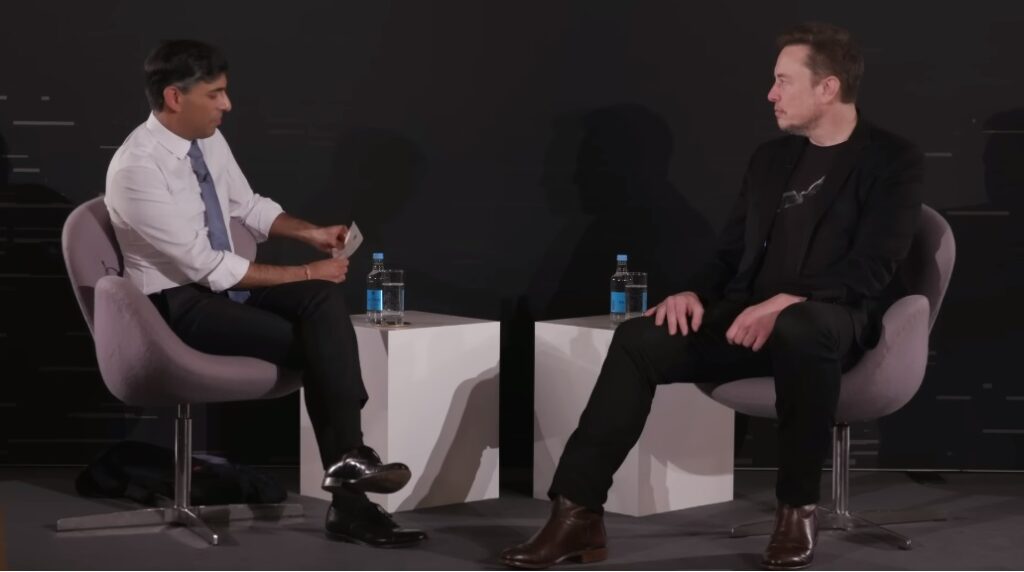
UK Prime Minister Rishi Sunak recently sat down for an enlightening discussion on artificial intelligence with legendary innovator Elon Musk.
Their expansive dialogue touched on the promises and potential perils of AI, offering thought-provoking perspectives on how society can maximize the benefits of this transformative technology while responsibly mitigating risks.
Promoting Innovation Responsibly

A core theme that emerged was the need for sensible government oversight to promote innovation responsibly. As Sunak stated, “Governments have an important role to play in acting as a ‘referee’ and safeguarding public safety, just as in other high-risk areas like aviation and automobiles.”
However, he stressed, “This oversight should not unnecessarily obstruct progress and must be narrowly targeted at addressing tangible risks that emerge.”
Musk concurred, noting that “the pace of advancement in AI is extraordinarily rapid, with capabilities doubling every few months by some estimates.”
Thus regulators face the difficult task of acting quickly enough to get ahead of potential dangers from misuse of AI, “without throwing up excessive roadblocks to innovation.”
Both leaders agreed sensible oversight and regulation can help steer this powerful technology toward benefits for humanity while averting harm. In Musk’s words, “sensible oversight can make things the least amount untrue.”
Managing the Risks

Musk and Sunak delved extensively into specific risks posed by AI advancement that require thoughtful management.
One major area of concern they focused on is so-called “deep fakes” – manipulated video or audio content that depicts events or speech that never actually occurred.
As Musk warned, “As AI grows increasingly capable of generating ultra-realistic fake media, this could enable large-scale coordinated misinformation campaigns, fraud, or defamation at new levels.”
Potential solutions Musk proposed include “digital watermarking of media to authenticate it as real, as well as requiring even minimal payments to access certain platforms or content, which would make deploying massive bot armies to spread false information economically infeasible.”
The rapid evolution of AI also makes it difficult to foresee how systems will behave as they grow more advanced. Musk argued, “New AI models should face rigorous third-party testing in simulation before release, to ensure reasonable safety and prevent unintended consequences as capabilities expand.”
Sunak concurred on the importance of this oversight capability, highlighting the UK government’s investments in developing the expertise and resources for independent vetting of AI systems.
When discussing futures with abundant AI and robotics permeating the environment, Musk also spotlighted a unique risk of humanoid robots – the fact their mobility enables misuse if improperly constrained.
He argued for built-in safeguards like physical off switches and local overrides that are immune from software hacks or remote interference.
As Musk quipped, this could avert scenarios of robots “chasing people down,” however unlikely.
While said partly in jest, his point highlights the value of hardwired controls when emerging technologies intersect with the physical world.
Realizing the Rewards
Balancing prudent risk management, Sunak and Musk took a largely optimistic view that artificial intelligence has immense potential to benefit humanity if guided responsibly.
In Musk’s words, he envisions an “age of abundance” where advanced AI systems can provide “unlimited material goods, services, and educational opportunities.”
Similarly, Sunak foresaw AI improving access to personalized education, transforming healthcare, and making day-to-day government services more seamless and frictionless.
But Musk cautions realizing this potential first requires addressing the prerequisite of safety. If the risks can be reasonably managed, the gains could be unprecedented, ushering in an era of prosperity at a scale previously unimaginable.
Both leaders recognize AI as a transformative general-purpose technology laden with both great promise and possible pitfalls.
Their nuanced discussion reinforced that proactive collaboration between government, research institutions, and industry will be needed to promote the responsible development of AI, maximizing the longer-term gains for humanity while mitigating near-term risks.
With sensible governance and prudent risk mitigation, Musk believes AI could usher in an era of abundance where “everyone will have access to goods and services and education.”
But achieving this future demands sustained vigilance, collective responsibility, and ethical considerations among all actors developing and deploying this uniquely disruptive technology.
Human Agency, Ethics, and Existential Questions

The far-ranging dialogue also touched on deeper issues surrounding human ethics and the preservation of human agency as AI capabilities advance.
Musk argued a profound open question all societies must grapple with is “how we maintain meaning, purpose, and fulfillment in a world where AI excels at most human endeavors.”
He even envisioned advanced AI “friends” providing companionship. However, Musk reiterated his well-known concerns that unchecked advancement of general machine intelligence could eventually eclipse human-level cognitive abilities, with unforeseeable consequences.
He cautioned we cannot take for granted that super-human AI will remain friendly to its human creators absent explicit efforts to encode human values.
In Musk’s view, “it is critical that human ethics and moral considerations actively shape how AI is developed going forward, not just raw technical capabilities.”
Broader Perspectives on Societal Impact

Touching on the broader societal impacts of emerging technology, Prime Minister Sunak noted surging public concerns about jobs and employment displacement.
Based on current evidence, he argued AI thus far appears to be more an empowering tool than a wholesale replacement for human roles and skills. But amidst the coming disruption, sustaining an agile, adaptive workforce will remain a priority.
As Sunak stated, “Education and skills training must continue to evolve and expand access, enabling smooth labor market transitions by keeping pace with innovation.”
Musk generally concurred that while AI will render many existing occupations and tasks obsolete, he also envisions newfound freedom and flexibility to pursue passions, creativity, and meaning once freed from work primarily driven by economic necessity.
In his words, AI may lead to a world where “everyone will have access to this magic genie and you’ll be able to ask any question.”
These thought-provoking insights from two leading voices operating at the intersection of technology and governance offer an important perspective on the promise and perils of AI.
Their far-reaching dialogue embodies a shared hope that with responsible development, AI can catalyze enormous progress – while acknowledging this depends on proactive efforts to create this future. Realizing the full promise, Musk argues, hinges on addressing risks upfront.
But if societies engage wisely and urgently with the technology’s challenges and opportunities, the immense potential exists to chart a course toward prosperity.
Mapping the Path Forward

This summit represents precisely the kinds of conversations needed to guide AI toward beneficial outcomes.
Ongoing dialogue between government, industry, academia, and the public is critical to steer this extraordinarily disruptive technology toward broad benefit.
Carefully tailored governance can provide guardrails without sacrificing progress. Industry executives must internalize ethical considerations and risk mitigation as priorities, not afterthoughts.
Academic and non-profit researchers play a crucial role in identifying emerging issues through interdisciplinary analysis. And public awareness and input ensure human values and priorities ultimately prevail.
AI holds huge promise to empower humanity with knowledge, reduce suffering, and unlock greater opportunities.
But as Musk cautions, the window for prudent action is narrow given AI’s blistering pace of advancement. The choices made today on research priorities, ethical standards, and governance could determine whether utopian or catastrophic scenarios prevail.
With so much at stake, informed, practical conversations on managing this world-shaping force are an indispensable starting point.
By revealing aligned intentions across government and industry for the responsible development of AI, this summit represents a small but meaningful step toward seizing the benefits, while averting the dangers that could emerge from AI’s unfettered development absent foresight and care.
